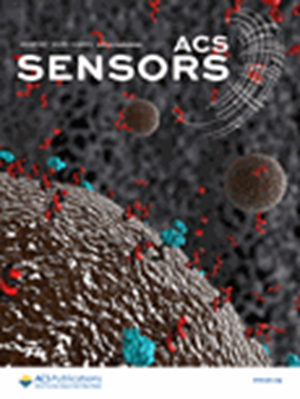Intrinsic Kinetic Control Enables Scalable and Ultrasensitive Single-Molecule Sensing.
IF 9.1
1区 化学
Q1 CHEMISTRY, ANALYTICAL
引用次数: 0
Abstract
Dynamic single-molecule sensing (DSMS) enables real-time monitoring of molecular interactions with exceptional sensitivity and kinetic resolution, offering significant potential for ultrasensitive biomarker detection. However, existing DSMS platforms often require probe redesign or external force modulation to tune binding kinetics, which limits system simplicity and scalability. Here, we report an intrinsically regulated DSMS platform engineered through systematic optimization of nanoparticle size and buffer ionic strength. We first established a theoretical model describing two dominant kinetic regimes─damping-dominated and entropic-confinement-dominated dynamics─and identified a critical inflection point where sensitivity and specificity are balanced. While this model provides insights into kinetic tuning, practical challenges such as nanoparticle heterogeneity and matrix complexity limit its direct application for sensor design. To address this, we empirically optimized a previously developed DSMS system using average binding dwell time and total binding events as two key performance indicators. The optimized platform, featuring 150 nm polystyrene nanoparticles under 150 mM NaCl, achieved femtomolar detection of thrombin and HIV-1 p24 antigen with limits of detection of 213.9 fM and 4.3 fM, respectively. Notably, the platform maintained excellent specificity in diluted serum through dwell-time filtering, highlighting its robustness in complex biological matrices. This work establishes a novel DSMS strategy that enables efficient single-molecule sensing without probe modification or external actuation, paving the way for scalable, high-performance biomarker detection in clinical diagnostics and point-of-care applications.内在动力学控制使可扩展和超灵敏的单分子传感。
动态单分子传感(DSMS)能够实时监测分子相互作用,具有卓越的灵敏度和动力学分辨率,为超灵敏生物标志物检测提供了巨大的潜力。然而,现有的DSMS平台通常需要重新设计探针或外部力调制来调整结合动力学,这限制了系统的简单性和可扩展性。在这里,我们报告了一个内在调节的DSMS平台,通过系统优化纳米颗粒大小和缓冲离子强度。我们首先建立了一个理论模型,描述了两种主要的动力学机制──阻尼主导和熵受限主导──并确定了一个平衡敏感性和特异性的关键拐点。虽然该模型提供了动力学调谐的见解,但实际挑战,如纳米颗粒的非均质性和矩阵复杂性,限制了其在传感器设计中的直接应用。为了解决这个问题,我们利用平均结合停留时间和总结合事件作为两个关键性能指标,对先前开发的DSMS系统进行了实证优化。优化后的平台采用150 nm聚苯乙烯纳米颗粒,在150 mM NaCl下,实现了凝血酶和HIV-1 p24抗原的飞摩尔检测,检出限分别为213.9 fM和4.3 fM。值得注意的是,该平台通过驻留时间过滤在稀释后的血清中保持了良好的特异性,突出了其在复杂生物基质中的稳健性。这项工作建立了一种新的DSMS策略,可以在没有探针修饰或外部驱动的情况下实现高效的单分子传感,为临床诊断和护理点应用中可扩展的高性能生物标志物检测铺平了道路。
本文章由计算机程序翻译,如有差异,请以英文原文为准。
求助全文
约1分钟内获得全文
求助全文
来源期刊

ACS Sensors
Chemical Engineering-Bioengineering
CiteScore
14.50
自引率
3.40%
发文量
372
期刊介绍:
ACS Sensors is a peer-reviewed research journal that focuses on the dissemination of new and original knowledge in the field of sensor science, particularly those that selectively sense chemical or biological species or processes. The journal covers a broad range of topics, including but not limited to biosensors, chemical sensors, gas sensors, intracellular sensors, single molecule sensors, cell chips, and microfluidic devices. It aims to publish articles that address conceptual advances in sensing technology applicable to various types of analytes or application papers that report on the use of existing sensing concepts in new ways or for new analytes.
 求助内容:
求助内容: 应助结果提醒方式:
应助结果提醒方式:


